The 26th Tsinghua University Education Symposium's "Interdisciplinary Talent Development Scheme" seminar was held August 10 at Tsinghua University School of Economics and Management (Tsinghua SEM). More than 80 representatives from Tsinghua's schools, departments, and offices attended the seminar, chaired by Tsinghua associate dean XU Xin, in person and online.
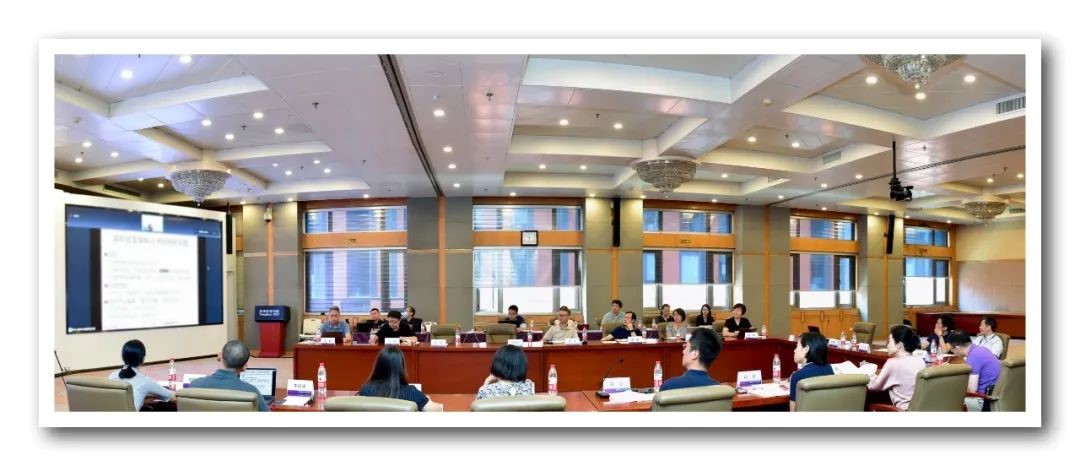
The seminar is held at Tsinghua SEM.
WU Ye, deputy dean of the Graduate School, said that the seminar was integral to the Educational Work Symposium. He said that postgraduate education and university degrees are evolving, adding that 2022 will be a big year for new majors and disciplines.
"The Ministry of Education is about to release a new edition of the catalog of disciplines and majors. A core change in the new edition of the catalog is the inclusion of interdisciplinary subjects. Interdisciplinary learning and subjects at the intersection of different disciplines will become an important growth point. I hope today's seminar will boost the development of interdisciplinary learning in the future," WU said.
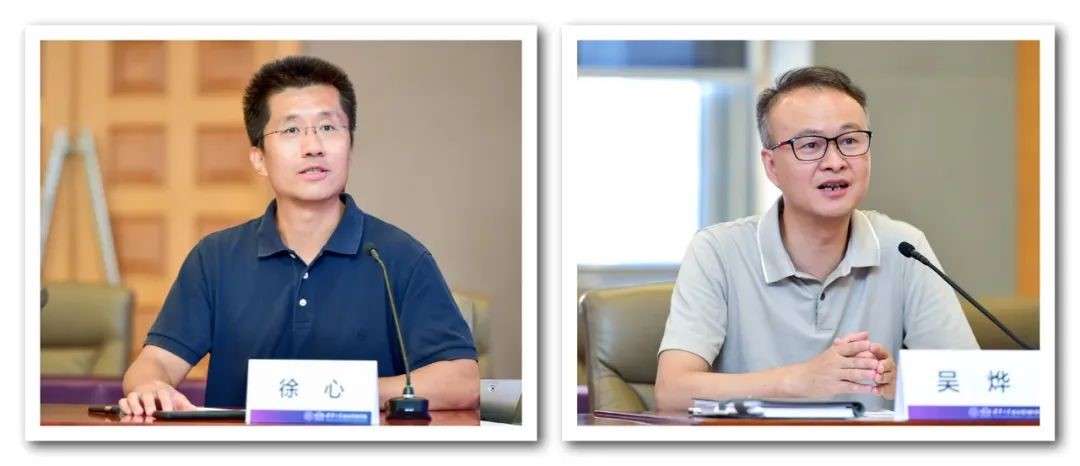
XU Xin (left) and WU Ye at the seminar.
YANG Huazhong, chairman of the Interdisciplinary Working Committee of the Academic Degree Evaluation Committee of Tsinghua University, made a keynote speech exploring the development of interdisciplinary talent in the integrated circuit industry. He emphasized that the key to interdisciplinary learning is "integration and penetration, combined as one." He explained that "interdisciplinarity is not a simple intersection of disciplines." He also said, "Engineering is the basic attribute of interdisciplinarity" and "interdisciplinary research should be carried out based on industry needs and key issues." Finally, he put forward his views on how to lead the development of interdisciplinary studies and improve the quality of training in Tsinghua's interdisciplinary talent development program.
WU Huaqiang, dean of the School of Integrated Circuits, also gave a speech about interdisciplinary talent development. He said that integrated circuit interdisciplinary talent should be jointly developed by all of the relevant university departments. He added that only deep cooperation with the integrated circuit industry could genuinely solve the problems China faces. Finally, he said that all parties should make concerted efforts to explore how to jointly develop Tsinghua's integrated circuit interdisciplinary talent and lead the development of multidisciplinary talent in China.
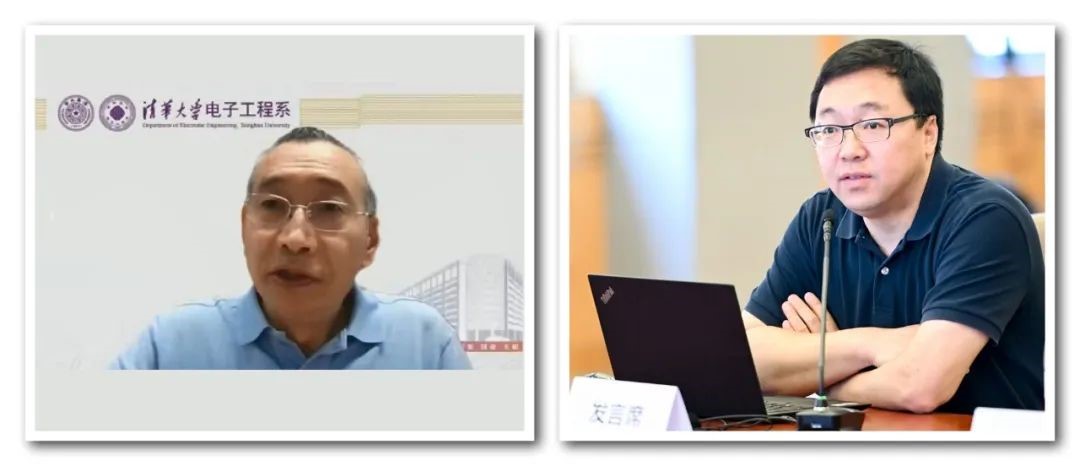
YANG Huazhong (left) and WU Huaqiang deliver reports at the seminar.
WANG Yu, dean of the Department of Electronic Engineering, and XUE Jian, deputy dean of Tsinghua SEM, jointly delivered a keynote speech titled "Departments' Interdisciplinary Development for Future Science and Technology."
WANG said the disciplinary nature of the Department of Electronic Engineering determines that it must develop interdisciplinarity. He added that the cooperation with Tsinghua SEM is beneficial for the department's development and supports discipline building, talent training, and the practical application of research results related to electronic information. Finally, he said that interdisciplinary subjects are inseparable from relationships and value systems, explaining that the key is to determine how to involve more teachers.
Subsequently, XUE Jian talked in detail about the "Future Science and Technology Program." She said that the program, which started in 2018, aims to train technology-based, strategic entrepreneurs across China. The target groups are leaders of the Chinese manufacturing industry, technology-driven originators, entrepreneurs focused on transformation and upgrading, and investors in the field of innovation. The program was upgraded in 2021 and cooperated with several Tsinghua University departments to establish a "10 + 1" alliance.
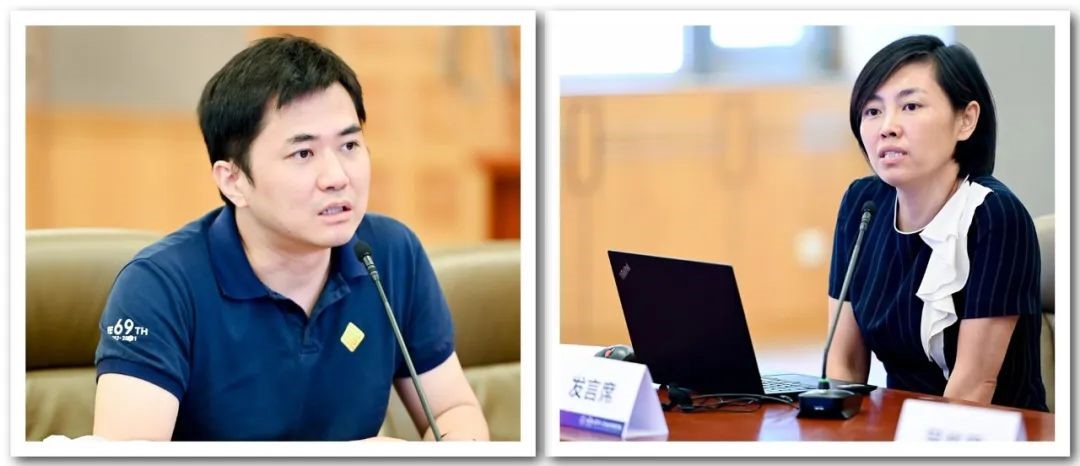
WANG Yu (left) and XUE Jian deliver reports at the seminar.
HE Zuoxiang, assistant dean of the School of Clinical Medicine and vice president of the Institute of Precision Medicine, shared the "Clinical Medicine Interdisciplinary Talent (Master) Program." He outlined the program's organizational structure, design ideas, program characteristics, curriculum settings, mentors, support conditions, enrollment, operation, and development exploration. By combining teaching and scientific research, the program has taken a concrete step on the interdisciplinary talent development journey.
LIU Xiao, academic director of the Master's Program in Digital Economy of the Tsinghua SEM, explained in detail the "Talent Development Scheme for Master's Degree in Digital Economy." She shared the extensive study and discussion of Tsinghua SEM and the School of Social Sciences to promote the training scheme for digital professionals. She stated the ambition to expand the training of digital talent and the in-depth cooperation of interdisciplinarity within the university. She also introduced the specific development scheme and project preparation.
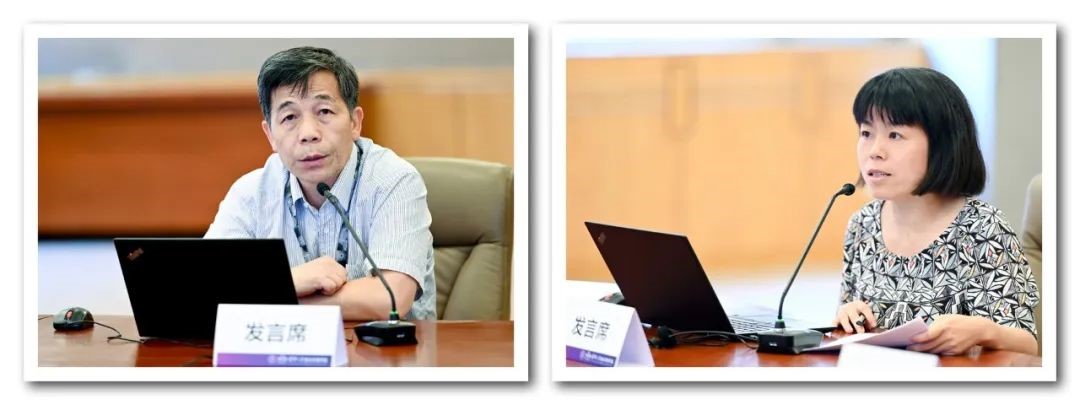
HE Zuoxiang (left) and LIU Xiao deliver themed reports at the seminar.
During the free discussion, SUN Xin, deputy dean of the Institute for Carbon Neutrality, talked about the problems and challenges of developing interdisciplinary talent. She said she believes that the critical thing about interdisciplinarity is integrating multiple disciplines' knowledge to form a new discipline paradigm. She shared several problems that need to be addressed, including mobilizing the enthusiasm of relevant departments, promoting the communication and interaction of teachers in related disciplines, coordinating the allocation of resources, and constructing the development system for students.
LIAN Yanqing, director of the Graduate School's Professional Degree Education Office, talked about how talent development and discipline building relate.
HE Ping, deputy dean of Tsinghua SEM, using the example of the double-degree undergraduate program in computer science and finance, proposed that cross-disciplinary talent training needs to balance the contradiction between the increasingly refined social division of labor and more frequent cross-integration.
LIU Han, deputy director of the Office of Arts, Humanities and Social Sciences Administration, shared three key points from his own experiences. Firstly, interdisciplinary talent development is derived from practical needs, and real-world problems are never divided according to disciplines. Secondly, the long-term foundation of interdisciplinary talent training lies in integrating general education and professional education. Thirdly, the key to developing multidisciplinary talent is promoting the exchange and integration of teachers of arts and sciences.
WANG Jing, deputy director of the Office of Development and Planning and deputy director of the Discipline Planning and Construction Office, said that the training of interdisciplinary talent should be explored from the two fundamentals of knowledge and organization.
ZHANG Qiang, deputy director of the Faculty Affairs Office and deputy director of the Human Resources Development Office, shared three suggestions. The first is to innovate the management mechanism for resource allocation and benefit distribution. The second is to build a world talent and innovation high ground. He also called for a 'floating mechanism,' which would require interdisciplinary institutions to attract many first-class scholars. Thirdly, he suggested strengthening the planning of spaces in which the public can engage with academia.
Professor CHEN Taotao of Tsinghua SEM said that interdisciplinary subjects are directly related to the current international and domestic situation. Demand comes from the needs of the real world and cannot be addressed by individual departments. She said she hopes that a flexible interdisciplinary mechanism could be established.
At the end of the seminar, WU Ye said that he agreed that all disciplines could be interdisciplinary, adding that not all fields could grow quickly into interdisciplinarity. He emphasized that the seminar aimed to redesign the whole interdisciplinary talent development process, from entry to exit. He added that this needs to be promoted through multiple rounds of discussions between departments and university organs. WU said that the thinking about and the exploration of interdisciplinarity and talent development should advance and deepen.
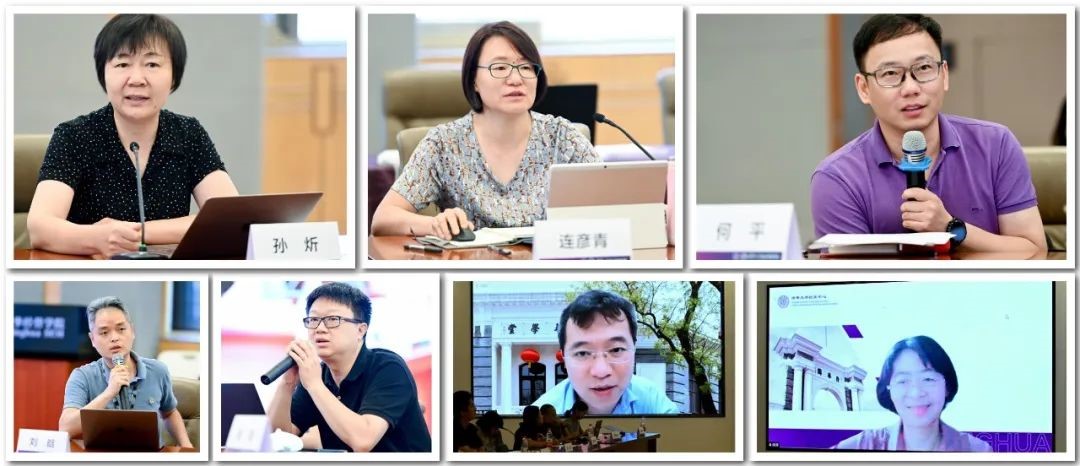
SUN Xin, LIAN Yanqing, HE Ping, LIU Han, WANG Jing, ZHANG Qiang, and CHEN Taotao deliver speeches at the seminar. (From left to right, from top to bottom)
The representatives were from Tsinghua SEM, the School of Integrated Circuits, the Department of Electronic Engineering, the School of Clinical Medicine, the Institute for Carbon Neutrality, the School of Social Sciences and Tsinghua's Graduate School, the Undergraduate Academic Affairs Office, the Research & Development Affairs Office, Office of Arts, the Humanities and Social Sciences Administration, the Faculty Affairs Office, the Office of Development and Planning, and other relevant departments.
Editor: REN Zhongxi
 Latest News
Latest News